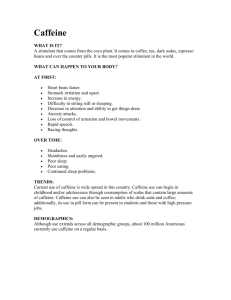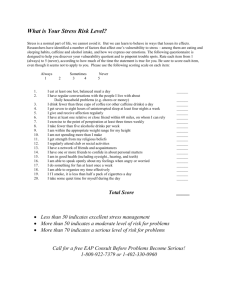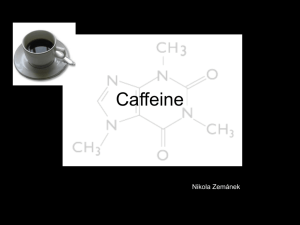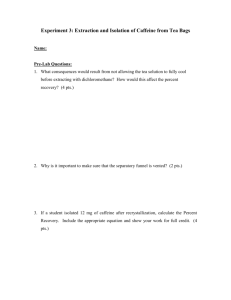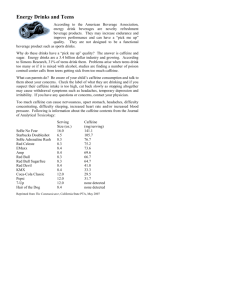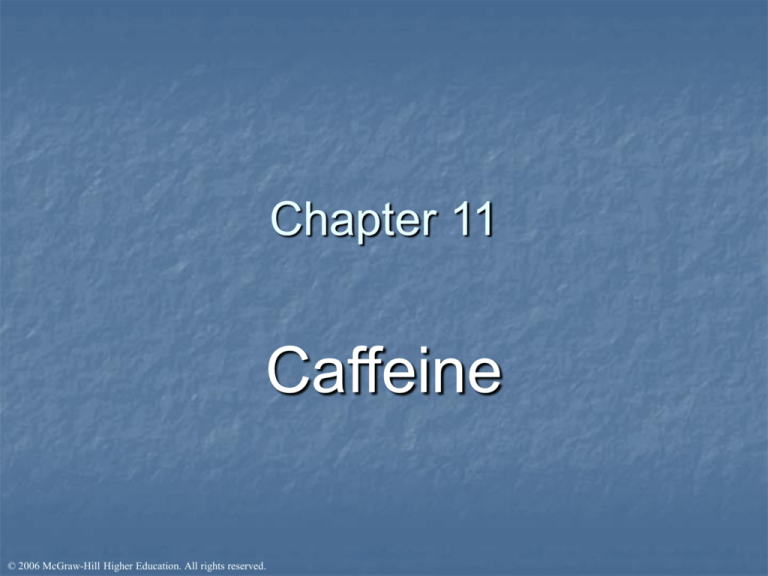
Chapter 11
Caffeine
© 2006 McGraw-Hill Higher Education. All rights reserved.
Caffeine
Caffeine is the most frequently consumed
stimulant in the world
It is classified as a xanthine (methylxanthine)
It is found in a number of beverages
Also found in some OTC medicines
In the U.S., the average daily intake of
caffeine is equivalent to 2 cups of coffee a
day.
© 2006 McGraw-Hill Higher Education. All rights reserved.
Caffeine Content of Beverages
and Chocolate
Beverage
Caffeine Content (mg)/cup
Brewed coffee
90-125
Instant coffee
35-164
Decaffeinated coffee
1-6
Tea
25-125
Cocoa
5-25
Coca-Cola
45
Pepsi-Cola
38
Mountain Dew
54
Chocolate bar
1-35
© 2006 McGraw-Hill Higher Education. All rights reserved.
Amount
5 oz.
5 oz.
5 oz.
5 oz.
5 oz.
12 oz.
12 oz.
12 oz.
1 oz.
Coffee
Goatherd to holy man
“The women’s petition against coffee”
Tax
Consumption increased during prohibition
Commercial roasting began in 1790
Starbucks
© 2006 McGraw-Hill Higher Education. All rights reserved.
Tea
350 AD
English East India Company
Popular in new colonies
Boston Tea Party
© 2006 McGraw-Hill Higher Education. All rights reserved.
Chocolate
Cocoa
17th century spread to wealthy in Europe
Drinks and houses
Bars
© 2006 McGraw-Hill Higher Education. All rights reserved.
Other Sources Of Caffeine
Soft drinks
Energy drinks
Over the counter pills
Other natural sources
© 2006 McGraw-Hill Higher Education. All rights reserved.
Effects of Xanthines
CNS effects
Enhances alertness, causes arousal,
diminishes fatigue
Adverse CNS effects
Insomnia, increase in tension, anxiety, and
initiation of muscle twitches
Over 500 milligrams - panic sensations, chills,
nausea, clumsiness
Extreme high doses (5 to 10 grams) seizures, respiratory failure, and death
© 2006 McGraw-Hill Higher Education. All rights reserved.
Effects of Xanthines
Cardiovascular effects
Low doses - heart activity increases, decreases, or
do nothing
High doses - rate of contraction of the heart
increases, minor vasodilation in most of the body,
cerebral blood vessels are vasoconstricted
Respiratory system effect
Can cause air passages to open and facilitate
breathing
© 2006 McGraw-Hill Higher Education. All rights reserved.
Caffeine
Caffeine Intoxication
Caffeinism: restlessness, nervousness, excitement,
insomnia, flushed face, diuresis, muscle twitching,
rambling thoughts and speech, stomach complaints
some research shows a relationship with:
cancers of the bladder, ovaries, colon, and kidneys
mammilary cysts
Caffeine Dependence
© 2006 McGraw-Hill Higher Education. All rights reserved.
OTC Drugs Containing Caffeine
Analgesics
Stay awake products
Picker-uppers
Herbal Stimulants
Ephedrine
© 2006 McGraw-Hill Higher Education. All rights reserved.

